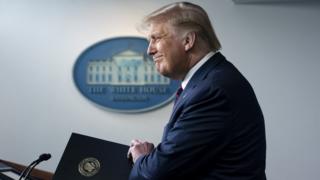 Image copyright EPA
Image copyright EPA
The US Food and Drug Administration (FDA) has given emergency authorisation for the use of plasma to treat coronavirus patients.
The technique uses antibody-rich blood plasma from people who've recovered from the disease, and has already been used on over 70,000 people in the US.
President Donald Trump said the treatment could reduce deaths by 35%.
It comes a day after he accused the FDA of impeding the rollout of vaccines and therapeutics for political reasons.
The announcement comes on the eve of the Republican National Convention, where Mr Trump will launch his campaign to win a second term in the White House.
"This is what I've been looking forward to doing for a long time," the president told reporters on Sunday. "I'm pleased to make a truly historic announcement in our battle against the China virus that will save countless lives."
President Trump described the procedure as a powerful therapy and he appealed for Americans to come forward to donate plasma if they've recovered from Covid-19.
The FDA said early research suggests blood plasma can decrease mortality and improve patient health if it's administered within the first three days of their hospitalisation.
The agency said it concluded it was safe after an extensive review of data collected during recent months. In a statement, it added that the benefits of the treatment outweighed any risks.
"It appeared that the product is safe and we're comfortable with that and we continue to see no concerning safety signals," said Peter Marks, director of the FDA's Center for Biologics Evaluation and Research, according to Reuters news agency.
But several experts, including Anthony Fauci, a member of the White House's coronavirus task force, have expressed reservations about the robustness of studies so far.
The FDA has already approved the use of plasma transfusions on coronavirus patients under certain conditions, like those who are gravely ill or taking part in clinical trials.
In a tweet on Saturday, President Trump said "the deep state, or whoever, at the FDA is making it very difficult for drug companies to get people in order to test the vaccines and therapeutics.
"Obviously, the are hoping to delay the answer until after [the US presidential election]," he added.
Earlier this year, US regulators gave emergency authorization to Gilead Science Inc's remdesivir as a therapeutic treatment for coronavirus.
Meanwhile, a report by the Financial Times suggests the White House is considering granting emergency authorisation for a vaccine being developed by Oxford University and pharmaceutical giant AstraZeneca, ahead of the US presidential election on 3 November. The White House has not commented on the story, but a spokesperson for AstraZeneca told Reuters that efficacy results for its trials were not expected until later this year.
More than 176,000 people have died from coronavirus since the start of the outbreak in the United States, according to a tally by Johns Hopkins University. Nearly 5.7 million cases have also been confirmed nationwide.
- A SIMPLE GUIDE: How do I protect myself?
- IMPACT: What the virus does to the body
- ENDGAME: How do we get out of this mess?
- WITHOUT SYMPTOMS: The mystery of 'silent spreaders'
from Via PakapNews